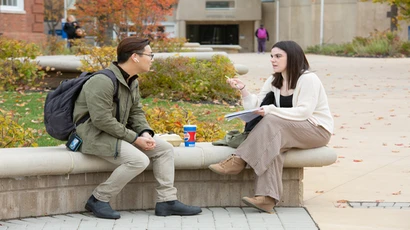If your emergency requires medical attention, University Police should be notified immediately at 716-673-3333. In the event of an after hours emergency, students can contact the Chautauqua County Crisis Hotline (1-800-724-0461) for mental health emergencies that require a response by mental health professionals.
Students living on campus may notify their Resident Advisor (RA) or Resident Director (RD) of the crisis, who may then decide to engage emergency services.
For more information see Crisis Services.
Appointments can be made in person or by phoning 716-673-3424. For more information see Appointments and Referrals.
The reception area is open Monday - Friday from 8:00 a.m. until 4:00 p.m. Counselors are available for appointments between the hours of 8:00 a.m. and 4:30 p.m.
The Counseling Center is located in LoGrasso Hall, just down the hallway from the Health Center. Our entrance faces Kasling and Grissom Residence Halls.
All registered Fredonia students may use the Counseling Center without charge. In addition, counseling staff are happy to assist faculty and staff members with concerns regarding registered students through consultation.
The Counseling Center is a safe place for Fredonia students. When you come here, you have the right to privacy. Counseling is strictly confidential and, unless it is a matter of saving human life, or we have been ordered by a court, no information is released to anyone without the student's written consent.
Professional counselors work individually or with groups to help students understand themselves better, resolve problems, come to terms with difficult issues, and/or address important decisions.
The purpose of counseling is not to tell students what to do, but to emphasize the ultimate responsibility each person has in conducting his or her own life.
There are several reasons why we may have been unable to answer your call. The most common reason is that our receptionist is using the phone to speak with another student who may be scheduling an appointment. Another possibility is that our receptionist may be on a scheduled break. There are regular 15-30 minute periods during each workday when the receptionist may not be available, although we try our best to have front desk coverage whenever possible.
If we are unable to answer your call, please leave a voicemail with your name, phone number, and a brief message. We will call you back as quickly as possible. If you call after hours, we will return your call the next business day.
If you would prefer not to wait in our waiting room, please let the receptionist know. We have a quiet wellness space with a table, chairs, and self-serve wellness items. We also have a private, quiet room that we can offer to students based on availability.

